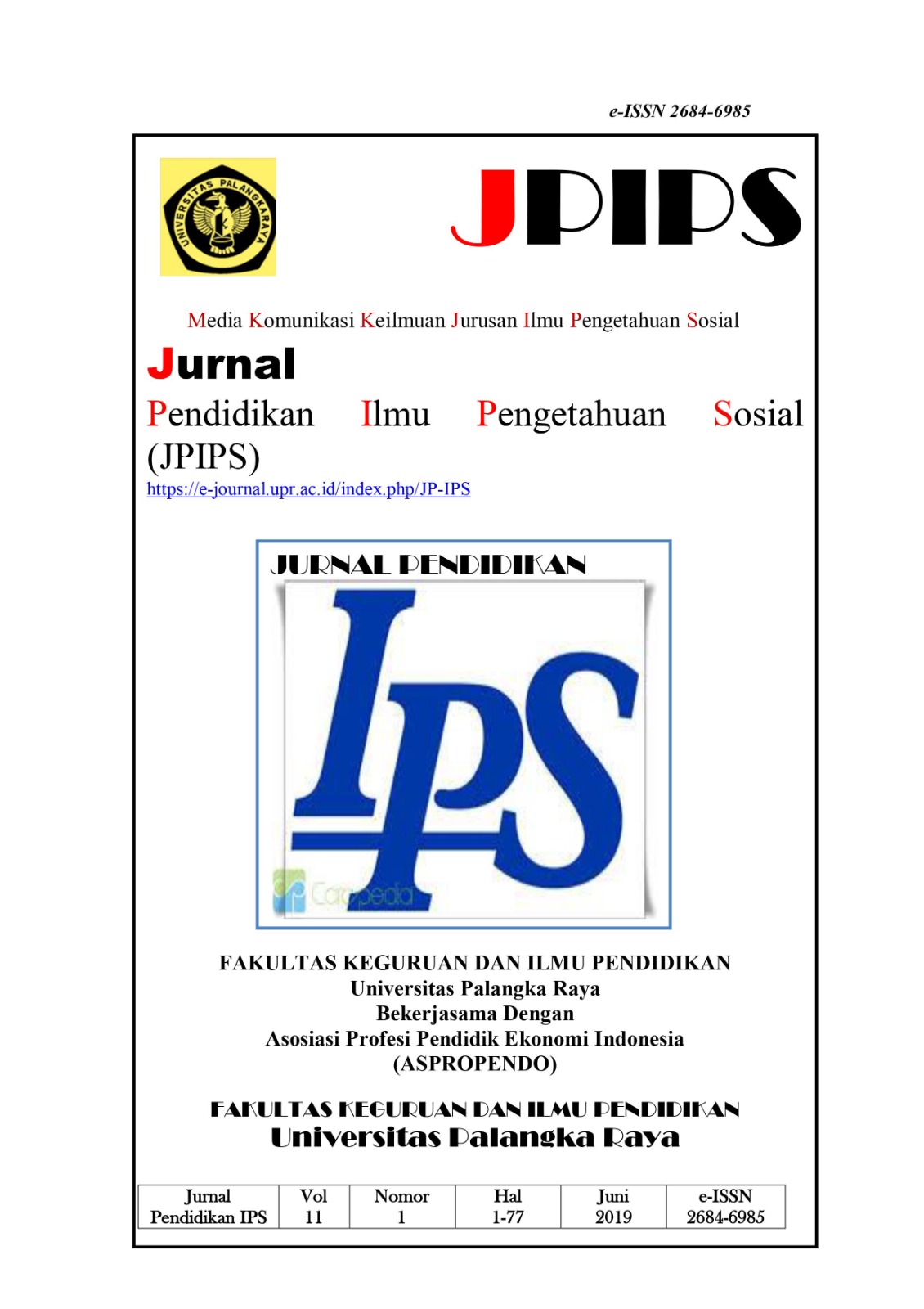Membangun Kesiapan Berwirausaha Dari Penguatan Pendidikan dan Efikasi Diri
DOI:
https://doi.org/10.37304/jpips.v16i2.17325Abstract
This research was conducted on students of the Indonesian School of Management (STIMI) Banjarmasin who are recipients of the Indonesian Student Business Competition Grant (KBMI) & the Student Entrepreneurship Coaching Program (P2MW) for the years 2018-2023, launched by the Ministry of Education, Culture, Research, and Technology. Entrepreneurship education is the process of instilling the spirit and essence of entrepreneurship to foster creativity and innovation in addressing problems, overcoming obstacles, managing various risks, and seizing opportunities for success. This study aims to determine the influence of Entrepreneurship Education (X1) and Self-Efficacy (X2) on Entrepreneurial Readiness (Y) among recipients of the KBMI & P2MW grants at STIMI Banjarmasin during the years 2018-2023. The population of this study consists of 39 individuals, which includes students and alumni of STIMI Banjarmasin who have previously received grants at the national level and obtained funding to develop their business ideas, with some having received grants two or three times. Since the population is less than 100, all population members are included as samples in this study. Data collection was conducted by distributing questionnaires through Google Forms, and data processing was carried out using SPSS 25. Data analysis techniques employed included Descriptive Statistical Analysis, Classical Assumption Testing, and Multiple Linear Regression Analysis.
Downloads
References
Agustina, T.; Gerhana, W.; Sulaiman, S. (2020). The Effect of Locus of Control, Learning, and Adversity Quotient Towards Micro Business Success (Study on Entrepreneurship under Foster Group of the Banjarmasin). Journal of Wetlands Environmental Management, 8(1), 21–32. https://doi.org/10.20527/jwem.v8i1.215
Agustina, Titien; Nurhikmah, Nurhikmah; Rudiansyah, M. (2022). The Influence of Locus of Control, Self-Efficacy, and Adversity Quotient on Business Performance. Economia (JECO), 18(1), 1–15. https://doi.org/https://doi.org/10.21831/economia.v18i1.34013
Agustina, T. (2019). Improving Business Performance Through Competitive Advantage: A Study On SMES In Banjarmasin, Indonesia. Eurasia: Economic & Business, 6(26), 39–59. https://doi.org/https://doi.org/10.18551/econeurasia.2019-06
Anand, F., & Meftahudin, M. (2020). Pengaruh Lingkungan Keluarga, Pendidikan Kewirausahaan, Efikasi Diri Dan Motivasi Terhadap Minat Berwirausaha Mahasiswa. Journal of Economic, Business and Engineering (JEBE), 2(1), 88–97. https://doi.org/10.32500/jebe.v2i1.1461
Anandita, F. B. A., &, & Saputra, S. D. (2015). nalisi Pengaruh Kepercayaan, Keamanan, Kualitas Pelayanan, dan Persepsi akan Risiko Terhadap Keputusan Pembelian Melalui Situs Jejaring Sosial. Jurnal Ekonomi Dan Kewirausahaan, 15, 203–210.
Arikunto, S. (2019). Prosedur Penelitian Suatu Pendekatan Praktik. Rineka Cipta.
Aspiannor, A. (2024). Entrepreneurial Readiness of Inmates at The Women’s Penitentiary Through Entrepreneurship Education And Self-Efficacy. Jurnal Ilmiah Ekotrans & Erudisi, 4(1), 16–31. https://doi.org/10.69989/ar0k4823
Astiti, A. F., & Margunani, M. (2019). Faktor-Faktor yang Mempengaruhi Kesiapan Berwirausaha. Jurnal Inovasi Pendidikan Ekonomi, 8(1), 47–62.
Bandura, A. (1977). Self-efficacy: Toward a unifying theory of behavioral change. Psychological Review, 84(2), 191–215. https://psycnet.apa.org/record/1977-25733-001
Bandura, A., & Wessels, S. (1994). Self-efficacy (Vol. 4). na.
Chaplin, J. P. (2011). Kamus Psikologi. PT RajaGrafindo Persada.
Ciana, N. P., & Rahmi, E. (2020). Pengaruh Pelaksanaan Pembelajaran Kewirausahaan dan Efikasi Diri Terhadap Kesiapan Berwirausaha Siswa Kelas XII di SMKN 1 Lubuk Basung. Jurnal Ecogen, 3(2), 332. https://doi.org/10.24036/jmpe.v3i2.8961
Dikti, B. (2024). Panduan Program Pembinaan Mahasiswa Wirausaha.
Eka Yuli, L. (2019). Pendidikan Kewirausahaan Dan Efikasi Diri Terhadap Kesiapan Berwirausaha Mahasiswa. Eklektik : Jurnal Pendidikan Ekonomi Dan Kewirausahaan, 1(2), 127. https://doi.org/10.24014/ekl.v1i2.7102
Farkhan, M. (2019). Pengaruh Pendidikan Kewirausahaan Dan Praktik Kewirausahaan Terhadap Kesiapan Berwirausaha. Jurnal Ekonomi & Pendidikan, 16(1), 1–7.
Gupron, G., Yandi, A., & Maharani, A. (2023). Model Kesiapan Berwirausaha (Literature Review). Jurnal Kewirausahaan Dan Multi Talenta, 1(1), 28–41. https://doi.org/10.38035/jkmt.v1i1.9
Hendro, H. (2011). Dasar-Dasar Kewirausahaan : Panduan Bagi Mahasiswa Untuk Mengenal, Memahami, Dan Memasuki Dunia Bisnis. Erlangga.
Hermawan, Y., Disman, D., Ahman, E., Suwatno, S., & Sundari, R. S. (2022). Pengaruh Pendidikan Kewirausahaan dan Kemampuan Kewirausahaan terhadap Efikasi Diri dan Dampaknya terhadap Kesiapan Berwirausahan. AdBispreneur, 7(2), 153–167. https://doi.org/10.24198/adbispreneur.v7i2.39332
Kemendikbudristekdikti. (2003). Undang-Undang Nomor 20 Tahun 2003. Dikti.
Liputan6.com. (2021). Rata-Rata Rasio Wirausaha di Negara Maju 12 Persen, Indonesia Baru 3,74 Persen. Liputan6.com. https://www.liputan6.com/bisnis/read/4617800/rata-rata-rasio-wirausaha-di-negara-maju-12-persen-indonesia-baru-374-persen
Locke, E. A. (1987). Social foundations of thought and action: A social-cognitive view. Academy of Management Briarcliff Manor, NY 10510.
Luthans, F., S. P. (2002). Employee Engagement and Manager Self-Efficacy: Implications for Managerial Effectiveness and Development. Journal of Management Development, 21, 376-387.
Nuhlasita, W. A. M., & Wulandari, R. N. A. (2022). Pengaruh Sikap, Efikasi Diri, dan Karakteristik Wirausaha terhadap Minat Berwirausaha Mahasiswa. Jurnal Inovasi Pendidikan Ekonomi (JIPE), 12(1), 51. https://doi.org/10.24036/011166370
Purnami, N. M. and, & Adnyana, I. G. L. (2016). Pengaruh Pendidikan Kewirausahaan, Self Efficacy Dan Locus Of Control Pada Niat Berwirausaha. E-Jurnal Manajemen Unud, 5(2), 1160–1188. https://media.neliti.com/media/publications/253915-pengaruh-pendidikan-kewirausahaan-self-e-18441d7f.pdf
Ratumbuysang, M. F. N. G., & Rasyid, A. A. (2015). Peranan orang tua, lingkungan, dan pembelajaran kewirausahaan terhadap kesiapan berwirausaha. Jurnal Pendidikan Vokasi, 5(1), 15. https://doi.org/10.21831/jpv.v5i1.6058
RI, K. (2013). Konsep dan Implementasi Kurikulum 2013. Sekretariat Negara RI.
RI, K. S. N. (2022). Peraturan Presiden (Perpres) Nomor 2 Tahun 2022 tentang Pengembangan Kewirausahaan Nasional Tahun 2021-2024.
Santrock, J. W. (1973). Psikologi Perkembangan. Mc Graw Hill.
Sanusi, A. (2014). Metodologi Penelitian Bisnis (4th ed.). Salemba Empat.
Saroni, M. (2012). Mendidik dan Melatih Entrepreneur Muda. Ar-Ruzz Media.
Slameto, S. (2015). Belajar dan Faktor-Faktor Yg Mempengaruhinya. Rineka Cipta.
Suherman, E. (2010). Desain Pembelajaran Kewirausahaan. Alfabeta.
Utami, C. W. (2017). Attitude, subjective norm, perceived behaviour, entrepreneurship education and self efficacy toward entrepreneurial intention university student in Indonesia.
Widiyanto, A. S. I. M. (2020). Analisis Empiris Faktor-Faktor Yang Mempengaruhi Kesiapan Berwirausaha Warga Binaan Lembaga Pemasyarakatan. EQUILIBRIUM : Jurnal Ilmiah Ekonomi Dan Pembelajarannya, 8(1), 28. https://doi.org/10.25273/equilibrium.v8i1.5885
Widoyo, H. (2023). Pentingnya Pendidikan Dalam Kehidupan. https://binus.ac.id/character-building/2023/02/pentingnya-pendidikan-dalam-kehidupan/
Yunita, D. (2020). Pengaruh Kreatifitas, Efikasi Diri, dan Motivasi Terhadap KEsiapan Berwirausaha Mahasiswa Fakultas Keguruan dan Ilmu Pendidikan Universitas Jambi. Jurnal Manajemen Pendidikan Dan IImu Sosial, 1(2), 506–515. https://doi.org/10.38035/JMPIS














